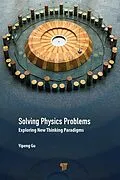This book provides a complete, consistent, and open system for studying physics problems, which not only provides high-quality teaching materials for the field of physics education (especially for Physics Olympiad training) but also points out a new direction for physics education. In this book, a form of methodology, which can comprehensively present cogitation discipline, is built up for analyzing and solving complex physics problems. The text analyzes plenty of physics problems (classical mechanics) from both theoretical and philosophical points of view to reveal the way of exerting this form. As a set of methodology reflecting the cogitation discipline, the thinking paradigm proposed in this book (called the MLQ-(ST)C paradigm) is a theoretical tool to develop people's acquisition of this ability. The paradigm successfully deconstructs the elements and the structure in physical thinking and then eliminates the obstacles of people's underlying thinking, so that all the thinking built on it can be clear and ordered. The physics problems included in this book are significantly more difficult than similar books within the same theoretical domains involved, leading to better teaching and learning value.
Autorentext
Yipeng Gu obtained his PhD in condensed matter physics in 2014 from Jilin University, China. He teaches physics at the School of Natural Science, Changchun University of Science and Technology, China. Dr. Gu's research interests span the philosophy of physics, theory of physics education, and the innovation and development of physics models. He is an experienced coach for Physics Olympiad and has taught basic courses of college physics and topic courses of physics competition for students who participated in the Chinese Physics Olympiad in Jilin Province, China. His students have won prizes in various levels of physics competitions, including six gold medals in the final contest of Chinese Physics Olympiad.
Klappentext
This book provides a complete, self-consistent, and open system for studying physics problems, which not only provides high-quality teaching materials for the field of physics education (especially for physics Olympiad training) but also points out a new direction for physics education. In this book, a form of methodology, which can comprehensively present cogitation discipline, is built up for analyzing and solving complex physics problems. The text analyzes plenty of physics problems (classical mechanics) from both theoretical and philosophical points of view to reveal the way of exerting this form. As a set of methodology reflecting the cogitation discipline, the thinking paradigm proposed in this book (called the MLQ-(ST)C paradigm) is a theoretical tool to cultivate people to acquire this ability. The paradigm successfully deconstructs the elements and the structure in physical thinking and then eliminates the obstacles of people's underlying thinking, so that all the thinking built on it can be clear and ordered. The physics problems included in this book are much more difficult than similar books within the same theoretical domains involved, leading to better teaching and learning value.
Inhalt
1. A Thinking Paradigm for Solving Physical Problems
2. Kinematics Model
3. Dynamics Model
4. Rigid Body Model
5. Vibration Model
6. Two-body Model
7. Fluid Model
